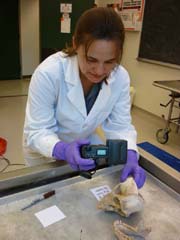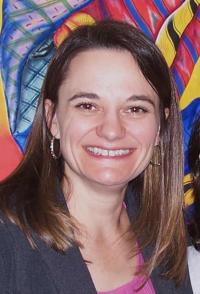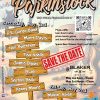Presentation on “New Insights into Human Evolution” offered at MJC


(Modesto, CA) – The Modesto Area Partners in Science (MAPS) will offer a presentation entitled “New Insights into Human Evolution from the Rising Star Cave in South Africa” by Debra Bolter, Ph.D., MJC professor of anthropology and research associate with the Evolutionary Studies Institute in South Africa. The free event is scheduled for Friday, October 23 at 7:30 p.m. in the Mary Stuart Rogers Student Center on Modesto Junior College’s West Campus, 2201 Blue Gum Avenue, Modesto.
Bolter will present her work on the new hominid species, Homo naledi, published recently in the open access science journal eLife and featured in the October issue of National Geographic. These remarkable fossil remains were recently discovered and excavated at the Rising Star Cave in South Africa, the “Cradle of Humankind.”
The fossils represent a collection of multiple individuals who laid buried 30 meters underground, undisturbed until recreational cavers accidentally stumbled on the hidden chamber in 2013. Bolter’s talk will be an overview of the cave site, the context of the chamber, and a discussion of the new insights on human evolution that this collection of over 1500 specimens provides to anthropologists and paleoanthropologists.
“This MAPS presentation is an exciting opportunity to showcase one of our own scientists from Modesto Junior College who is performing some groundbreaking research with international acclaim,” said Brian Sanders, dean of Science, Mathematics and Engineering at MJC.
Bolter was recruited to lead the investigation of the immature remains from the Rising Star Cave based on her research on primate life history, which focuses on early life stage of development. She approaches the study of immature individuals through the integration of information from body multiple systems: cranial, dental, skeletal, and from soft tissue like muscle, fat and skin. Her research on growth and development includes vervet and colobine monkeys, and apes — both species of chimpanzees, gibbons and gorillas.
Overview articles lay out her approach to methods of study ongrowth, development and life history, implications for interpretation of fossil growth and development during human evolution, and more recently, interpretations of soft tissue body composition evolution from australopithecines to Homo.
As a research associate in the Evolutionary Studies Institute at the University of the Witwatersrand in Johannesburg, she continues to study and work on fossil remains from South Africa.
The free public MAPS event is intended for people over 12 years of age.
For more information about the MAPS program visit the website http://maps.events.mjc.edu/, the Facebook page https://www.facebook.com/pages/Modesto-Area-Partners-in-Science/244618054801 or contact MJC Professor Noah Hughes at 575-6800 or hughesn@mjc.edu.









